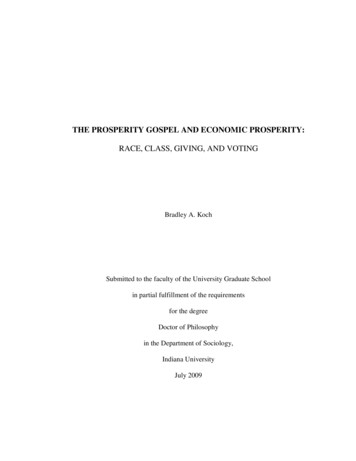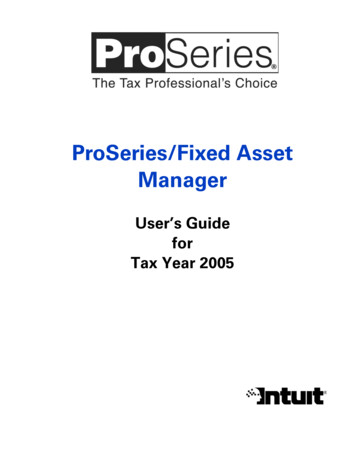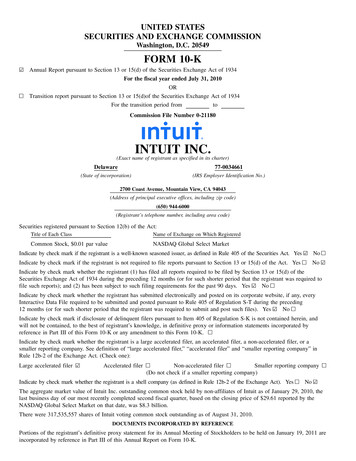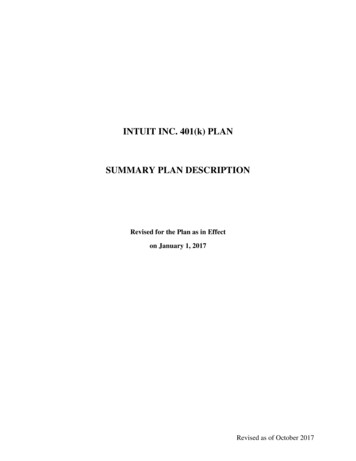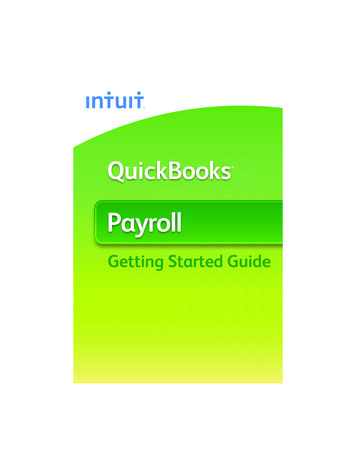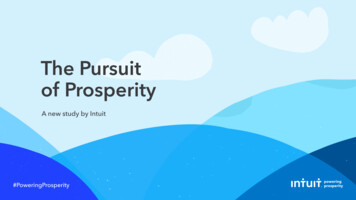
Transcription
The Pursuitof ProsperityA new study by Intuit#PoweringProsperity
As part of our mission to power prosperity around the world, Intuitconducted The Pursuit of Prosperity Study to better understand: how Americans define prosperity how different factors impact your ability to live the life you want how you feel about your current financial standing how you plan to achieve greater prosperity how it influences your outlook for the futureIntuit partnered with Kelton Global to survey over 3,000 Americansto understand today’s pursuit of prosperity.2
Executive Summary4Prosperity Status: It’s Complicated53 Major Barriers to Prosperity6U.S. Economy7Personal Identity8Finances9Chasing the American Dream is Worth It11Managing Finances12Entrepreneurship and Empowerment13Can-do Attitude15Final Thoughts16Research Methodology173
EXE C U T I V E S UM M A RYProsperity Status: It’s ComplicatedFacing Financial BarriersChasing the American Dream is Worth ItProsperity is different for every American, but regardless ofyour circumstances, you should be able to live the life you want.Most Americans feel prosperity is currently out of reach, but areoptimistic for the future.Nearly all Americans (87%) believe meeting financial goals is keyto achieving prosperity. But the challenge of managing financescreates tough situations. Many Americans face at least one orsometimes even multiple challenges, like living paycheck-topaycheck (45%), not having any money in a savings account (44%),being too far in debt (36%) and not being able to fully supportthemselves (19%).Despite lingering concerns, Americans still have reason to hope forfinancial success, and this optimism and perseverance is sparkinga new entrepreneurial spirit. 36% of Americans are consideringgetting a side gig or an additional source of income. 1 in 3Americans are thinking about becoming business owners or selfemployed within the next five years.So most Americans are postponing key personal milestones likepurchasing a home (30%), retiring (22%), starting a business (19%),starting a family (22%) or getting married (19%).In fact, small business owners are nearly twice as likely to feel moreprosperous than those working traditional 9-to-5 jobs.4
78%58%are hopeful toachieve prosperityin the futureof Americansfeel prosperity iscurrently out of reachProsperity Status: It’s ComplicatedProsperity is different for every American. The unique circumstancesof each person’s life, everything from gender, ethnicity andsexual identity to zip code, education and even access to betteropportunities, create a complex playing field with uneven odds ofsuccess and different perceptions of what it means to prosper.But regardless of your circumstances, you should be able to livethe life you want. While most Americans feel prosperity is currentlyout of reach, you are still optimistic for the future.We’ve entered a new chapter of the American dream, where thepath to prosperity comes with new and more difficult barriers, but aspirit of perseverance and entrepreneurialism propels you forward.5
3 Major Barriers to ProsperityU.S. EconomyIn the study, Americans shared three key barriers to prosperity.Two of those barriers, the U.S. Economy and personal identity, arebeyond your control, which can cause a great deal of frustrationand stress.The third barrier, finances, is actually within your control, and offersa powerful opportunity to enhance your prosperity.Personal IdentityFinances6
58%of Americansbelieve the economyis holding them backDespite Growth, Economic Barriers StillChallenge AmericansThe U.S. economy grew nearly 3% in 2018, the second-strongestshowing of the nearly 10-year-old expansion, while job growthaveraged 223,000 per month1. However, many reports aren’t tellingthe full picture of prosperity in the U.S.Even in a growing economy, a majority of Americans believe thecurrent U.S economic landscape is preventing them from livingthe life they want.1 ected-181-000/3098383002/7
Women of color aremuch more likely thanCaucasian womenand men to feel theyface barriers15%AfricanAmericanAmericans Restricted by Personal IdentityBarriers4%Individuals believe their identities are creating barriers toovercome. Overall, 46% of Americans cite ethnicity, gender, raceor sexual orientation as hurdles. More specifically, 53% of theLGBTQ community feels held back by their personal identity.3 in 10 Americans feel they need equal opportunities in order tobecome prosperous and live the life they merican8
55%of Americans don’tfeel confident inmanaging theirfinancesFinancial Uncertainty Causes Challenges87% of Americans believe meeting financial goals is key toachieving prosperity, but they lack the confidence and skillsto manage their finances, which results in tough situations.Financial inexperience causes numerous problems4544Living paycheckto-paycheckNot having any moneyin a savings account3619Being too far in debtNot being able to fullysupport themselves%%%%9
30%Purchasing a homeFinances postponemajor milestones22%Putting Life on Hold78% of Americans are pressing pause on important plans andmoments in their lives due to their finances.22%19%Retiring19%Starting a familyStarting a businessGetting married10
Chasing the American Dream is Worth ItDespite their concerns, Americans believe prosperity will eventuallybe within reach, or in some cases, that they’re already attaining it.Their hopes and success are rooted in three key behaviors:1. Managing finances2. Start a business or become self-employed3. Maintain an optimistic, can-do spirit80%of Americans seefinancial successin their future11
60%Reaping the Rewards of ManagingYour FinancesMany Americans believe that improving how they manage theirfinances can result in emotional and mental benefits. For example,younger generations (18-37) are more likely than other generationsto believe better financial practices will bring them more happiness(52%) and a greater sense of freedom (51%).LGBTQ Americans are more likely than their heterosexualcounterparts to feel improved financial practices will bring themhappiness (51%). They also feel more confident that they will beable to manage their finances better in the next five years (41%).Peace of mind54Americans seebenefits in managingfinances44%More happiness47%%Furthermore, 26% of small business owners believe enhancedfinancial skills would allow them to have more professional growth.Relief from stress36%A sense of freedomSleep better at night12
1in 3Americans are consideringbecoming business ownersor self-employedA New Wave of EntrepreneurshipStarting a business or becoming self-employed are seen as majoropportunities by Americans, and serve as key drivers of prosperity.Americans are willing to go to great lengths and make sacrifices toenable their prosperity.2xAmerican small businessowners are twice as likelyto feel prosperous thana 9-to-5 workerFor example, Millennials (27%) are more likely than Gen Xers (20%)or Boomers (16%) to choose to make less money for the chanceto be their own boss. The payoff is substantial — 38% of smallbusiness owners say they have already achieved prosperity, whileonly 19% of non-business owners feel they’ve done the same.13
Small business owners are:25less likely to say a lack of a financial safety net wouldprevent them from working for themselves%18less likely to say a lack of overhead costs are a financialbarrier that would prevent them from working for themselves%8less likely to say a lack of access to a loan would preventthem from working for themselves6less likely to say a lack of personal experience wouldprevent them from working for themselves%Entrepreneurs OvercomeBarriersBusiness owners seem to have a mindset thatenables them to overcome barriers. They are lesslikely to let financial or personal issues becomebarriers to success.Small business ownersare less fazed by barriersthan non-businessowners%12less likely to say being afraid to fail is a personal barrier thatwould prevent them from working for themselves19less likely to say that their inability to take risks is a personalbarrier that would prevent them from working for themselves%%14
2 in 5people who haveimmigrated believe whatthey need to achieveprosperity is within reachDriven by an Optimistic, Can-Do SpiritAmong the Americans surveyed, several key groups stand out withtheir optimism for success today and in the future.African-American women, while facing barriers, are more likely thanCaucasian-American women to feel it is easier to become financiallysuccessful today (45% vs 36%), and that it will be even easier five(46% vs. 34%) or twenty years down the line (45% vs. 35%).People who have immigrated to the United States are more hopefulthan those born in the U.S. to feel that the life they desire will finallybe possible. They are more likely to believe that the U.S. economyis in a good place (57% vs. 49%) and makes it easier to prosper(46% vs. 43%).Females who immigrated are more likely than males whoimmigrated to feel what they need to live the life they want iswithin reach (47% vs. 35%).15
Final ThoughtsWhile prosperity feels out of reach for many, and numerous barrierscreate uneven odds, Americans are still forging ahead, hopeful intheir pursuit of prosperity.We’ve entered a new chapter of the American dream, where a spiritof perseverance and entrepreneurialism propels Americans forward.For more information about The Pursuit of Prosperity Study by Intuit,please contact Scott Fulmer@intuit.com or Kelton Global.16
Research MethodologyThe Intuit Prosperity Survey was fielded to 3,163 Americans ages18 in the U.S. via an online survey between February 11th, 2019to February 19th, 2019.Participants are members of opt-in panels and were recruitedvia email invitation. Quotas were set using US. Census figuresto ensure the demographic breakdown of the sample isrepresentative of the larger population of US adults.Statistical significance is based off a confidence interval of 95%.A value being statistically significant compared to another valuemeans there is a 95% chance that the difference between thosetwo values is real, not just for this instance, but that it can betranslated to the rest of the population. All comparison pointswithin our data are statistically significant. Results of any sampleare subject to sampling variation. The magnitude of the variationis measurable and is affected by the number of interviews andthe level of the percentages expressing the results.In this particular study, the chances are 95 in 100 that a surveyresult does not vary, plus or minus, by more than 1.7 percentfrom the result that would be obtained if interviews had beenconducted with all persons in the universe represented by thesample. The margin of error for any subgroups will be slightlyhigher. The base sizes of all subgroups within the analysis are100 .Kelton Global is a leading global insights firm serving as a partnerto more than 100 of the Fortune 500 and thousands of smallercompanies and organizations. For more information about KeltonGlobal please call 1.888.8.KELTON or visit www.keltonglobal.com.17
As part of our mission to power prosperity around the world, Intuit conducted The Pursuit of Prosperity Study to better understand: how Americans define prosperity how different factors impact your ability to live the life you want how you feel about your current financial standing how you plan to achieve greater prosperity how it influences your outlook for the future


